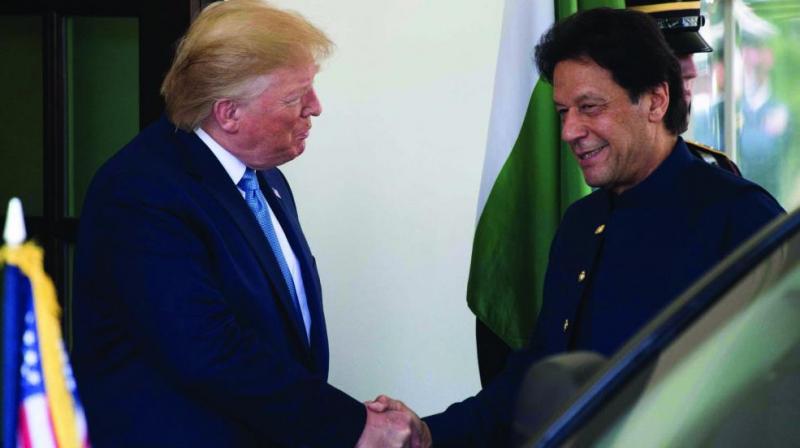For all Trump’s Islamophobia, Khan has scored a diplomatic win

Afew days before Prime Minister Imran Khan arrived in Washington D.C., American news networks were focused on four women. The four women, brown and black and all duly elected, had become subjects of President Donald Trump’s ire.
In a tweet that Sunday, the President denounced the women, Congresswomen Ayanna Pressley, Rashida Tlaib, Alexandra Ocasio-Cortez and Ilhan Omar, telling them to “go back to where they came from”. In the President’s view, the women (all except one of whom were actually born in the US) should go fix the problems from the places they came from instead of criticising the United States.
The President’s comments raised a tremendous outcry. House Democrats, colleagues of the congresswomen, introduced a resolution in the United States House of Representatives censuring the president for his comments. It was essential, many argued, to let the president know that he could not use such pejorative terms against the women. He could not, through his own racist invective, legitimise the idea that some skin colours were more American than others, or deride Representative Ilhan Omar simply because she had come to America as a Somali refugee, becoming a citizen later in life.
Everything in the US is divided. On this issue, too, there was division. When the matter came to a vote, it was split along party lines. Only four Republicans voted in favour of the censure resolution; everyone else toed the party line, making up this or that excuse. So inflamed were opinions that when Representative Eric Swallwell, a Democrat who until recently was also a presidential candidate, began to deliver a speech that called the president a racist, it angered Republicans to such an extent that they pulled out an old rule which allowed any speech claiming that the president was racist to be struck from the congressional record. The rule had not been used by anyone for hundreds of years. It had been put into place by one of America’s founding fathers, Thomas Jefferson.He had owned slaves and clearly had an interest in coming up with such a rule.
It must have been an odd thing for Prime Minister Imran Khan to step into a United States whose president was having such a visibly Islamophobic moment. It is not, of course, the first one.
It was interesting, then, to see whether Prime Minister Khan would represent a ‘Muslim’ prime minister or a Pakistani one. The former, one would assume, would not be able to ignore the despicable comments and policies President Trump has directed at Muslims. They would perhaps discuss the Muslim ban, the fact that United States aid disbursements are now targeted towards only Christian countries and the fact that discrimination against Muslims (a hefty number of whom are Pakistani) has risen to previously unprecedented proportions. Maybe, he would even express his consternation at the disrespect that had been heaped on Ilhan Omar, the first Muslim congresswomen in American history.
Prime Minister Imran Khan did not bring up Ilhan Omar and the raging controversy surrounding the racism that the president had heaped on her. Instead, he chose to bring up bilateral issues that directly affected his own people rather than the larger scheme of American and worldwide Muslims. It turned out well for him. Even before he met Mr Trump, he addressed an enormous crowd of tens of thousands of Pakistani Americans at the Capital One Arena in D.C. (a crowd, it was noted, far larger than the one President Trump drew at the same venue).
At the White House, he was greeted by an honour guard and a president who seemed to be in a far better mood than a week earlier, when the verbal lashing of the four Congresswomen had begun. Moving forward, Khan, who knows that the Indian prime minister had preceded him in a visit, played the diplomatic game impeccably. No thorny issues, such as the president and his supporters’ general disregard for Muslims, were discussed.
For his restraint, Khan was well rewarded; the kernel of news that emerged from the meeting was that President Trump was “willing to mediate between India and Pakistan over the Kashmir issue” (the Indian foreign office has denied that Modi asked for any mediation). Pakistan has been asking for such a commitment for quite some time. India has been jockeying against it. President Trump loves to be the big guy in the room, and now he could serve as just that in a dispute that India would have liked to consider a matter between two and not three countries. In being a Pakistani prime minister, Prime Minister Imran Khan may have changed the course of his nation and its future.
By arrangement with Dawn

